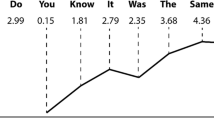Abstract
Previous empirical studies have suggested that language is primarily used to exchange social information, but our evidence on this derives mainly from English speakers. We present data from a study of natural conversations among Farsi (Persian) speakers in Iran and show that not only are conversation groups the same size as those observed in Europe and North America, but people also talk predominantly about social topics. We argue that these results reinforce the suggestion that language most likely evolved for the transmission of information about the social world. We also explore sex differences in conversational behavior: while the pattern is broadly similar between the sexes, men may be more sensitive than women are to discussing some topics in the presence of many other people.






Similar content being viewed by others
References
Dezecache, G., & Dunbar, R. I. M. (2012). Sharing the joke: The size of natural laughter groups. Evolution and Human Behavior, 33, 775–779.
Driver, J. (2001). A selective review of selective attention research from the past century. British Journal of Psychology, 92, 53–78.
Dunbar, R. I. M. (2016). Sexual segregation in human conversations. Behaviour, 153, 1–14.
Dunbar, R. I. M., Duncan, N., & Nettle, D. (1995). Size and structure of freely forming conversational groups. Human Nature, 6, 67–78.
Dunbar, R. I. M., Marriot, A., & Duncan, N. (1997). Human conversational behaviour. Human Nature, 8, 231–246.
Eggins, S., & Slade, D. (1997). Analysing casual conversation. London: Cassell.
Emler, N. (1994). Gossip, reputation and social adaption. In R. Goodman & A. Ben-Ze'ev (Eds.), Good gossip (pp. 119–140). Lawrence: University of Kansas Press.
Haviland, J. B. (1977). Gossip, reputation and knowledge in Zinacantan. Chicago: Chicago University Press.
Krems, J., Neuberg, S., & Dunbar, R. I. M. (2016). Something to talk about: Are conversation sizes constrained by mental modeling abilities? Evolution and Human Behavior, 37(6), 423–428.
Mesoudi, A., Whiten, A., & Dunbar, R. I. M. (2006). A bias for social information in human cultural transmission. British Journal of Psychology, 97, 405–423.
Moray, N. (1959). Attention in dichotic listening: Affective cues and the influence of instructions. Quarterly Journal of Experimental Psychology, 11, 56–60.
Morgan, T. J. H., Uomini, N. T., Rendell, L. E., Chouinard-Thuly, L., Street, S. E., Lewis, H. M., Cross, C. P., Evans, C., Kearney, R., de la Torre, I., Whiten, A., & Laland, K. N. (2015). Experimental evidence for the co-evolution of hominin tool-making teaching and language. Nature Communications, 6, 6029.
Redhead, G., & Dunbar, R. I. M. (2013). The functions of language: An experimental study. Evolutionary Psychology, 11, 845–854.
Tomasello, M. (2008). Origins of human communication. Cambridge: MIT Press.
Wiessner, P. W. (2014). Embers of society: Firelight talk among the Ju/‘hoansi bushmen. Proceedings of the National Academy of Sciences of the United States of America, 111, 14027–14035.
Wood, N., & Cowan, N. (1995). The cocktail party phenomenon revisited: How frequent are attention shifts to one’s name in an irrelevant auditory channel? Journal of Experimental Psychology: Learning, Memory, and Cognition, 21, 255–260.
Acknowledgements
RD’s research is funded by a European Research Council Advanced Investigator grant (#295663). This research also received financial support from the University of Tehran under grant number 27320/1/4.
Author information
Authors and Affiliations
Corresponding author
Rights and permissions
About this article
Cite this article
Dahmardeh, M., Dunbar, R.I.M. What Shall We Talk about in Farsi?. Hum Nat 28, 423–433 (2017). https://doi.org/10.1007/s12110-017-9300-4
Published:
Issue Date:
DOI: https://doi.org/10.1007/s12110-017-9300-4




